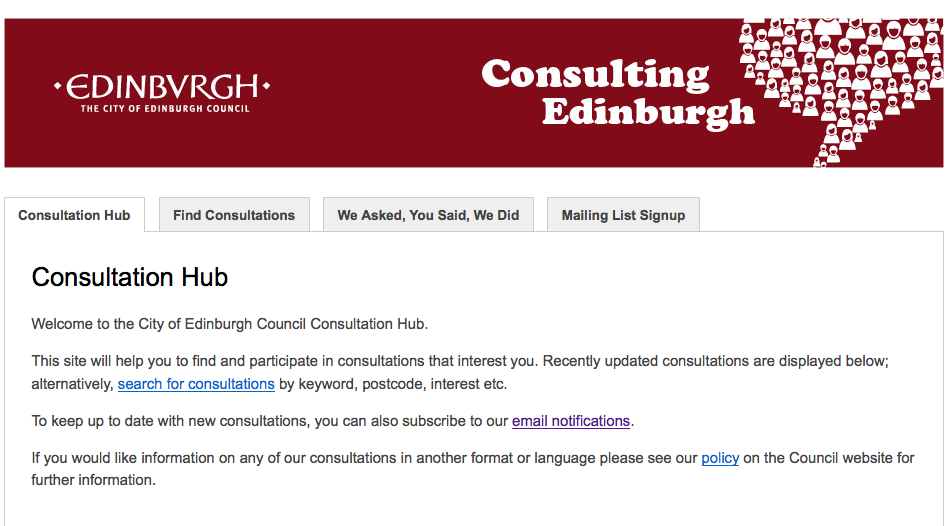Since launching their Citizen Space hub in September 2014, The City of Edinburgh Council in Scotland have published over 70 consultations on a wide range of different subjects. Topics consulted on (so far!) have ranged from the council’s budget for 2016-20 to 20mph speed limits for Edinburgh. In order to continue the successful roll out of Citizen Space across the organisation, the council took the initiative to organise their own internal user group.
“I know that those of us who attended the Scottish Citizen Space User Group last year found it really useful – so I wanted to do something similar for the rest of our users who couldn’t make it along or are new to the hub ”
Emma McEwan: Senior Business Intelligence Officer
 Running their first internal user group has enabled Edinburgh to reflect back on their Citizen Space adoption so far, and also to look ahead at how they continue to implement best practice consultation. Edinburgh were pleased with the attendance, comprising some who had never used Citizen Space before and wanted to, as well as others who had used the tool frequently and were able to share ideas and tips.
Running their first internal user group has enabled Edinburgh to reflect back on their Citizen Space adoption so far, and also to look ahead at how they continue to implement best practice consultation. Edinburgh were pleased with the attendance, comprising some who had never used Citizen Space before and wanted to, as well as others who had used the tool frequently and were able to share ideas and tips.
Prior to the user group, Citizen Space lead Emma McEwan took some time to assess how Edinburgh City Council have been using Citizen Space. This review enabled her to identify opportunities such as using Citizen Space’s non-linear surveys more often. By showing the group how this feature had been used in an interesting/engaging way by other organisations, Emma was able to open the eyes of the administrators to additional possibilities available to them.
“I know the guys in Transport, Planning and Licensing all loved non-linear surveys as they tend to consult on really detailed topics like the ones shown… so it gave them plenty food for thought!”
Emma McEwan: Senior Business Intelligence Officer
In terms of format, the day was broken into small manageable chunks ranging from updates on new features added to Citizen Space, to specific case studies of use across Edinburgh City Council. The user group saw a number of informal presentations from colleagues in Health and Social Care, Planning & Building Standards, and Communities & Families. The presentations focused on what the different departments had recently consulted on, the challenges they faced and also what’s in the pipeline.
Key challenges raised during the user group included the following:
- making sure the organisation has enough time to plan consultations effectively
- highlighting the importance of piloting surveys,
- focusing on how important it is to promote consultations effectively
- making consultations as engaging as possible
A handy list of practical tips also started emerging from the session, like when to use checkboxes vs radio buttons and the importance of using plain English. Following in the footsteps of the Scottish Government, the idea of asking for feedback on the actual consultation process was also suggested.
Following the initial success of this session, Edinburgh are thinking of holding user groups every six months. They hope to continue to improve upon the sessions and format, and have identified that the user groups could be a great opportunity to bring in guest speakers. For example, a dedicated training session on data security or privacy could help with up-skilling the team.
We’ll be continuing to run our annual Citizen Space user groups both in the UK and Australia, but if you’re interested in following Edinburgh’s lead and arranging your own user group for your organisation then here are some top tips:
- Manage the attendee list via handy free tools such as Eventbrite – helps steer clear of Excel lists!
- Invite guest speakers from outside the organisation to present to your group
- Ask us for examples of great consultations which you can show your attendees on the day. You could also check our aggregator for consultations being run by other orgs
- Ensure the room is set up in a format which reflects how you want the session to run. If the session needs to be more discursive, a round table may be best
- Ask users to talk about a particular consultation they’ve run and to give their honest insight about the process
- Keep the session as informal as you can and, if possible, provide coffee/food/snacks
- Collate product development feedback from the day and feed this back to your Delib account manager
- Use the session as an opportunity to launch any new procedures, your own guidance on good consultation, and top tips/learnings
- Feedback to attendees following the event
- Encourage attendees to get to know one another and to carry on the conversation/collaboration after the event